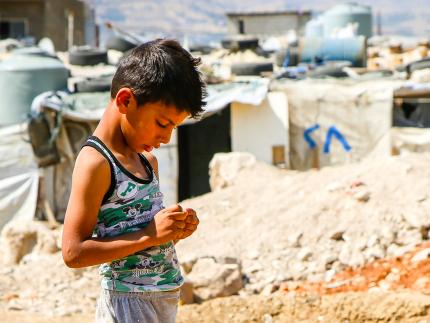Pressures on Aid in Lebanon

Nearly one-third of the people living in Lebanon today are refugees. The majority of these men, women, and children fled from Syria. Many have no homes to return to and remain in limbo, hoping to be resettled elsewhere.
For several years, World Renew has been working through its partner MERATH in Lebanon to mobilize local churches to respond to the many needs of these displaced people. But new pressures are complicating the situation.
Lebanon is one of the countries that relies most heavily on grain exports from Ukraine for food supply, but those exports have been affected by conflict. The lack of access to food has been compounded by political unrest within Lebanon, high inflation rates, a financial crisis that paralyzed banking transactions, and, of course, the Beirut explosion of 2020 that destroyed several months of grain reserves held in silos.
MERATH communications manager Sophie Nasrallah said, “People don’t know where their next meal is going to come from. It reminds me of God’s people in the wilderness, when they really had to rely on God’s manna every day.”
Shortages of medicine and fuel are a tremendous concern right now within Lebanon, and even those residents who can access money for these items are finding prices impossible.
“Many of our qualified people are leaving because they can’t earn a decent income anymore,” Nasrallah said. For everyone else, she explained, “It’s hard to even ask how they’re doing. Everyone is burnt out.”
Because funding to its supporting churches has been decreasing, MERATH has had to make some very difficult decisions. The same church members who previously chose to serve their Syrian neighbors despite a fraught history are now struggling to make ends meet themselves.
“Funding is decreasing as compared to previous years, so we are not only making tough decisions about whom we can assist, but we are also making even tougher decisions about whom we will stop helping, although everyone still needs help so badly, and our partner churches have established meaningful relationships with them. This means we’re scaling down when we should be scaling up,” explained Nasrallah.
World Renew’s Global Food Crisis fund is helping to support partners in Lebanon and in other countries that are at an extremely high risk of hunger and of ongoing food insecurity.
"Our comfort is in believing that God is in control, and that even though we might not be able to keep on supporting all families, God will provide. We know that our local partner churches who have established meaningful relationships with vulnerable families will continue to check up on them and help in any way they are able to," said Nasrallah.
To learn more about World Renew’s Global Food Crisis response, visit worldrenew.ca/global-food-security.


